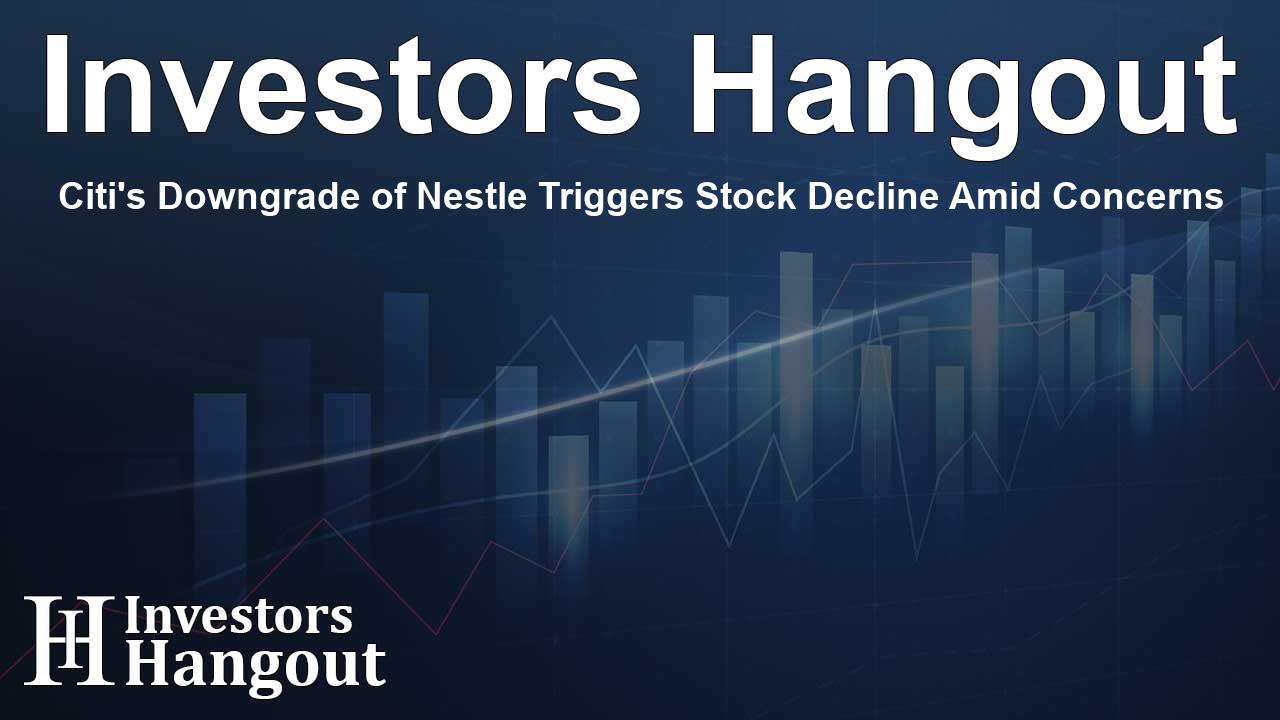Citi's Downgrade of Nestle Triggers Stock Decline Amid Concerns

Nestle Faces Downgrade by Citi Analysts
Nestle SA (SIX: NESN) has recently found itself under pressure as analysts at Citi made the decision to downgrade the company's shares from Buy to Neutral. This shift in rating stems from concerns regarding short-term earnings and a noticeable slowdown in the company's organic sales growth (OSG).
Price Target Adjustments
In conjunction with the downgrade, Citi analysts have reduced Nestle's price target from CHF105 to CHF90. This adjustment only offers a modest upside potential of around 7% from current trading levels, which undoubtedly adds to investor hesitation.
Factors Behind the Downgrade
Analysts predict that Nestle may encounter a 6% downside in its consensus earnings for fiscal year 2025. This forecast is attributed to rising costs associated with goods sold (COGS), pricing constraints, and increasing operational expenses. Moreover, limited returns on investments further fuel concerns leading to this downgrade.
Operational Margin Projections
Citi forecasts that Nestle will experience significant margin pressures in the coming years, predicting a 17.3% margin for fiscal year 2024 and a further decline to 16.4% in fiscal year 2025. These figures fall below the company's own guidance range of 17.5-18.5% as well as consensus margin estimates, indicating a concerning trend for investors.
Expectations from the New CEO
Citi analysts suggest that the prospective new CEO of Nestle may seek the flexibility to reinvest, which could lead to an updated target for fiscal year 2025. They estimate this target to range between 16-17%. Notably, their adjusted earnings per share (EPS) prediction stands 6% lower than the current consensus.
Market Performance Analysis
Despite adequate advertising and promotional spending, Citi believes that Nestle's recent performance issues are not merely a result of underinvestment but are influenced by broader category dynamics within the market. Their analysis points to a disconcerting trend where Nestle's product categories significantly underperformed compared to peers, reversing an earlier period of outperformance during the COVID pandemic.
Challenges in Brand Growth
Given the current landscape, analysts argue that simply increasing brand support may not provide a sufficient solution to the company's challenges in the short term. While a thorough portfolio review could potentially address Nestle's growth issues, it may inadvertently lead to a short-term dilution of EPS, particularly if share buybacks are excluded from the strategy.
Potential Strategies for Improvement
There are discussions surrounding the potential sale of Nestle's stake in L'Oréal as a strategy to raise funds. However, analysts believe it would be more prudent to allocate such funds towards strategic deals that enhance organic sales growth rather than using them for share buybacks, which could yield short-term EPS growth without necessarily improving long-term valuation.
Looking Ahead
As Nestle navigates through these challenging waters, the outlook remains focused on how the management team will adapt to the market dynamics in order to regain momentum. Stakeholders will be keenly observing these developments and strategizing their next moves in response to Citi's recent downgrade.
Frequently Asked Questions
What caused Citi to downgrade Nestle's stock?
Citi downgraded Nestle due to concerns over short-term earnings risks and a slowdown in organic sales growth.
What is the new price target for Nestle shares?
The new price target set by Citi for Nestle is CHF90, indicating a 7% potential upside from current levels.
How might the new CEO impact Nestle?
There's speculation that the new CEO may seek to adjust the fiscal year 2025 targets to allow for reinvestment, possibly affecting future margins.
What are the margin forecasts for Nestle?
Citi projects that Nestle will see margins of 17.3% in 2024 and 16.4% in 2025, falling short of the company's guidance and market consensus.
Is a portfolio review expected to help Nestle?
A portfolio review might address growth issues, but it could also lead to short-term earnings dilution without share buybacks.
About The Author
Contact Owen Jenkins privately here. Or send an email with ATTN: Owen Jenkins as the subject to contact@investorshangout.com.
About Investors Hangout
Investors Hangout is a leading online stock forum for financial discussion and learning, offering a wide range of free tools and resources. It draws in traders of all levels, who exchange market knowledge, investigate trading tactics, and keep an eye on industry developments in real time. Featuring financial articles, stock message boards, quotes, charts, company profiles, and live news updates. Through cooperative learning and a wealth of informational resources, it helps users from novices creating their first portfolios to experts honing their techniques. Join Investors Hangout today: https://investorshangout.com/
The content of this article is based on factual, publicly available information and does not represent legal, financial, or investment advice. Investors Hangout does not offer financial advice, and the author is not a licensed financial advisor. Consult a qualified advisor before making any financial or investment decisions based on this article. This article should not be considered advice to purchase, sell, or hold any securities or other investments. If any of the material provided here is inaccurate, please contact us for corrections.
